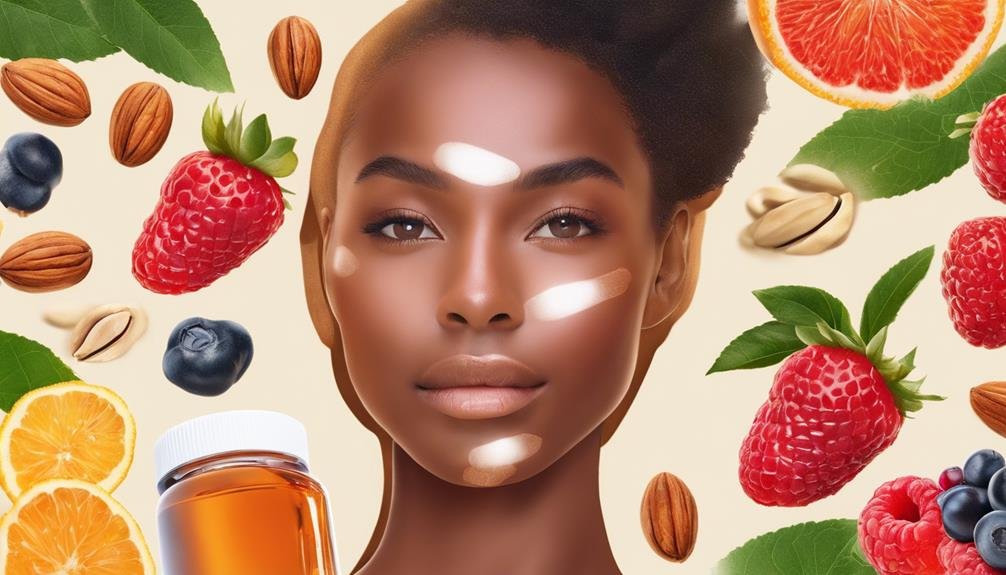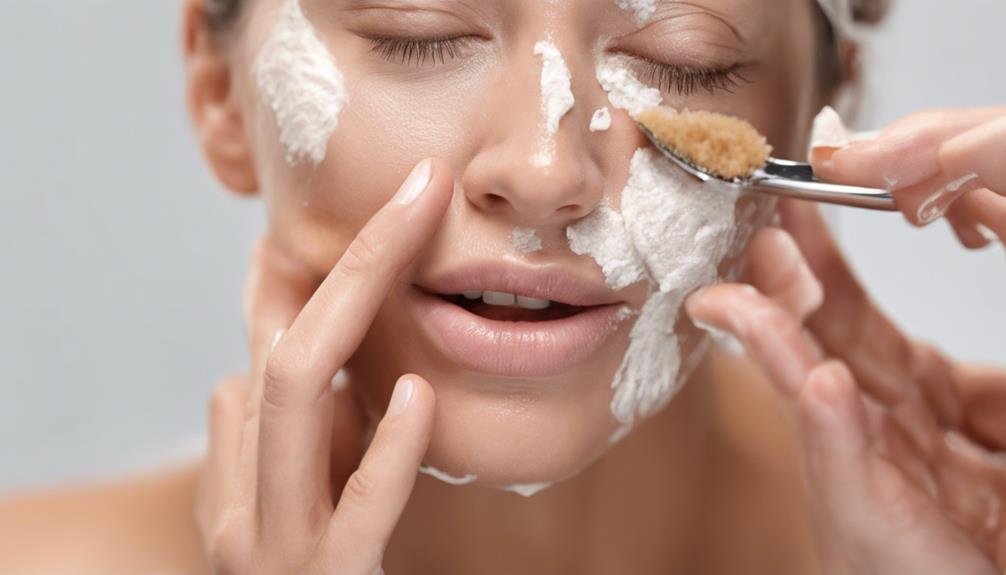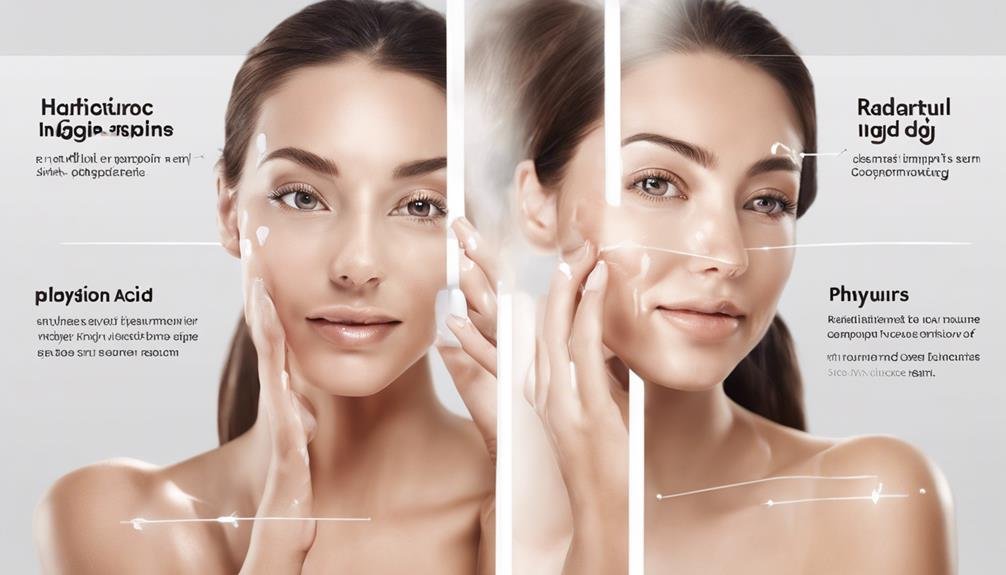"Cherishing Little Steps - A Haven for Baby and Family Journeys"
Anti-Aging Skincare Tips and Tricks
To combat signs of aging effectively, incorporating a consistent sunscreen application routine is crucial. But, did you know there are other key elements to consider that can elevate your anti-aging skincare game? From the importance of hydration to the power of antioxidants and gentle cleansing techniques, there are numerous strategies that can help you maintain youthful-looking skin. Keep on reading to discover more effective tips and tricks that can support your journey towards healthier and more vibrant skin.
Key Takeaways
- Use sunscreen daily to prevent premature aging.
- Incorporate antioxidants like Vitamin C for skin protection.
- Hydrate skin with water and Hyaluronic Acid.
- Consider retinol for collagen production and skin renewal.
- Practice stress management for overall skin health.
Importance of Sunscreen

When it comes to maintaining youthful skin, one of the most crucial steps you can take is incorporating sunscreen into your daily skincare routine. Sunscreen isn't just for sunny days at the beach; it should be a non-negotiable part of your morning regimen year-round. Exposure to the sun's harmful UV rays is one of the primary causes of premature aging, leading to wrinkles, fine lines, and age spots.
By applying a broad-spectrum sunscreen with an SPF of 30 or higher daily, you protect your skin from these damaging effects.
Sunscreen works by creating a barrier that absorbs or reflects the sun's rays, preventing them from penetrating the skin and causing damage. It's essential to apply sunscreen generously and reapply every two hours, especially if you're outdoors or participating in water activities.
Hydration Is Key
To maintain youthful and radiant skin, ensuring proper hydration is essential. Hydrated skin is more resilient, plump, and better able to fight signs of aging. Here are some hydration tips to keep your skin glowing:
| Hydration Tip | Details | Benefits |
|---|---|---|
| Drink Water | Aim for at least 8 glasses a day | Improves skin elasticity |
| Use Hyaluronic Acid | Apply a serum with this ingredient | Boosts skin moisture levels |
| Eat Water-Rich Foods | Include fruits like watermelon | Provides hydration from within |
Power of Antioxidants

Unlock the potential of antioxidants for your skin's health and vitality. Antioxidants are powerhouse ingredients that combat free radicals, the unstable molecules that contribute to premature aging. By incorporating antioxidants into your skincare routine, you can protect your skin from environmental stressors, reduce inflammation, and promote a youthful complexion.
Vitamin C is a popular antioxidant known for its brightening and collagen-boosting properties. It helps even out skin tone, fade dark spots, and improve overall skin texture.
Another potent antioxidant is Vitamin E, which hydrates the skin, strengthens the skin barrier, and helps in repairing damage caused by UV radiation.
Green tea extract, resveratrol, and niacinamide are also antioxidants that offer anti-aging benefits. These ingredients help to minimize fine lines, wrinkles, and sagging skin, giving you a more youthful appearance.
When selecting skincare products, look for serums, moisturizers, and treatments that are rich in antioxidants to maximize their benefits. Incorporating antioxidants into your daily skincare routine can help you achieve healthier, more radiant skin for years to come.
Gentle Cleansing Techniques
Harnessing the power of gentle cleansing techniques is vital for maintaining your skin's health and youthful appearance. When it comes to anti-aging skincare, how you cleanse your face plays a crucial role in preserving its radiance and elasticity. Opt for a gentle cleanser that's free of harsh chemicals and fragrances, as these can strip away natural oils and lead to dryness and irritation. Use lukewarm water to wash your face, as hot water can be too harsh on the skin and contribute to moisture loss.
When cleansing, do so with light, upward circular motions to stimulate circulation and gently remove impurities without tugging or pulling on the delicate skin. Avoid using abrasive scrubs that can cause micro-tears and damage your skin's barrier.
Pat your face dry with a soft towel instead of rubbing vigorously to prevent unnecessary friction. By incorporating these gentle cleansing techniques into your skincare routine, you can effectively support your skin's natural rejuvenation process and maintain a youthful glow.
Incorporating Retinol
Utilizing retinol in your skincare routine can be a game-changer when it comes to combating signs of aging. Retinol, a form of vitamin A, has been shown to improve skin texture, reduce the appearance of fine lines and wrinkles, and promote a more youthful complexion. Here are some tips for incorporating retinol effectively into your anti-aging regimen:
- Start Slow: Begin by using retinol once or twice a week to allow your skin to adjust to this powerful ingredient.
- Apply at Night: Retinol can make your skin more sensitive to sunlight, so it's best to apply it at night and always follow up with sunscreen during the day.
- Moisturize: To prevent dryness and irritation, make sure to moisturize your skin regularly when using retinol.
- Patience is Key: Results from retinol may take some time to show, so be patient and consistent with your routine for the best outcomes.
Benefits of Vitamin C
Discover the numerous benefits of incorporating vitamin C into your skincare routine.
Vitamin C is a powerful antioxidant that helps protect your skin from damage caused by free radicals. It promotes collagen production, which can help reduce the appearance of fine lines and wrinkles, giving your skin a more youthful look.
Additionally, vitamin C brightens the skin by reducing hyperpigmentation and dark spots, leading to a more even skin tone.
When applied topically, vitamin C can also help fight against sun damage and UV-induced photodamage. It aids in repairing and preventing skin damage, making it an essential component in any anti-aging skincare routine.
Vitamin C serums are a popular choice for many individuals looking to boost their skin's health and appearance. Remember to look for stable forms of vitamin C in your skincare products to ensure maximum effectiveness.
Incorporating vitamin C into your daily skincare regimen can help you achieve a radiant and youthful complexion while protecting your skin from environmental stressors.
Exfoliation for Renewal

To achieve skin renewal and a smoother complexion, incorporating exfoliation into your skincare routine is essential. Exfoliation helps remove dead skin cells, unclogs pores, and promotes cell turnover, revealing healthier, more youthful-looking skin. Here are some tips to make the most out of your exfoliation routine:
- Choose the Right Exfoliant: Opt for a gentle exfoliant suited to your skin type, such as chemical exfoliants with alpha hydroxy acids (AHAs) or beta hydroxy acids (BHAs) for sensitive skin, or physical exfoliants like scrubs for normal to oily skin.
- Follow a Consistent Schedule: Exfoliate 1-3 times a week, depending on your skin's sensitivity and needs. Over-exfoliation can irritate the skin, so find a balance that works for you.
- Be Gentle: Avoid harsh scrubbing, especially if you have sensitive skin. Use light pressure and gentle circular motions to exfoliate effectively without causing damage.
- Moisturize After Exfoliation: Hydrate your skin with a nourishing moisturizer post-exfoliation to maintain skin barrier integrity and prevent dryness.
Importance of Eye Cream
For a comprehensive anti-aging skincare regimen that addresses multiple facets of skin rejuvenation, it's essential to recognize the significance of incorporating an eye cream into your daily routine.
The skin around your eyes is delicate and prone to showing signs of aging, such as fine lines, wrinkles, puffiness, and dark circles. Eye creams are specially formulated to target these specific concerns, providing hydration, firming, and brightening effects to help combat the visible effects of aging.
By using an eye cream consistently, you can help maintain the elasticity and suppleness of the skin around your eyes, promoting a more youthful and radiant appearance. Additionally, eye creams often contain ingredients like peptides, retinol, hyaluronic acid, and antioxidants that work to stimulate collagen production, reduce inflammation, and protect against environmental damage.
Including an eye cream in your skincare routine is a proactive step towards preserving the delicate skin around your eyes and achieving a more youthful and vibrant look. Prioritizing this area with a targeted treatment can make a noticeable difference in how your skin ages over time.
Hyaluronic Acid Benefits

Exploring the benefits of hyaluronic acid in skincare reveals a powerhouse ingredient known for its exceptional hydrating properties. Hyaluronic acid, a naturally occurring substance in the body, plays a crucial role in maintaining skin hydration and elasticity. Here are some key benefits of incorporating hyaluronic acid into your skincare routine:
- Intense Hydration: Hyaluronic acid has the remarkable ability to hold up to 1000 times its weight in water, making it a superior hydrator for your skin.
- Plumps and Smooths: By retaining moisture, hyaluronic acid helps plump up the skin, reducing the appearance of fine lines and wrinkles.
- Improves Skin Texture: Regular use of hyaluronic acid can enhance skin texture, leaving it soft, supple, and radiant.
- Suitable for All Skin Types: Whether you have dry, oily, or sensitive skin, hyaluronic acid is gentle and effective for everyone.
Incorporating hyaluronic acid into your skincare regimen can help you achieve a hydrated, youthful complexion.
Sleep and Skin Health
Restful nights play a crucial role in maintaining optimal skin health. Quality sleep is not just essential for overall well-being; it also significantly impacts the condition of your skin. During deep sleep, the body enters repair mode, producing collagen that helps prevent sagging and fine lines. Lack of sleep can lead to increased cortisol levels, causing inflammation and breakouts. Here are some tips to improve your sleep quality for better skin health:
| Tips for Better Sleep | Benefits for Skin |
|---|---|
| Maintain a consistent sleep schedule | Enhances skin's ability to repair |
| Create a relaxing bedtime routine | Reduces stress, which can improve skin conditions |
| Invest in a comfortable mattress and pillows | Prevents sleep lines and potential skin creases |
| Keep your bedroom cool and dark | Enhances the production of melatonin, aiding skin repair |
Stress Management Tips

Ensuring proper stress management is vital for maintaining not only your mental well-being but also the health of your skin. Stress can significantly impact your skin's appearance and accelerate the aging process. Here are some tips to help you manage stress effectively:
- Practice Mindfulness: Engage in activities like meditation or deep breathing exercises to help calm your mind and reduce stress levels.
- Exercise Regularly: Physical activity releases endorphins that act as natural stress relievers and can improve your skin's overall health.
- Get Adequate Sleep: Lack of sleep can exacerbate stress levels and lead to skin issues. Aim for 7-9 hours of quality sleep each night.
- Maintain a Healthy Diet: Eating a balanced diet rich in fruits, vegetables, and omega-3 fatty acids can help combat stress and promote glowing skin from within.
Professional Skincare Treatments
Professional skincare treatments encompass a range of advanced procedures and therapies designed to address specific skin concerns and enhance skin health. These treatments are typically performed by trained skincare professionals in clinical settings.
Common professional skincare treatments include chemical peels, microdermabrasion, laser therapy, and microneedling.
Chemical peels involve the application of a chemical solution to the skin, which exfoliates the top layer to reveal smoother, more even-toned skin underneath.
Microdermabrasion uses a device to gently exfoliate and remove dead skin cells, promoting cell turnover and collagen production.
Laser therapy targets various skin issues like wrinkles, sun damage, and acne scars by stimulating collagen production and skin renewal.
Microneedling creates micro-injuries in the skin to trigger the body's natural healing process, leading to improved skin texture and firmness.
Before undergoing any professional skincare treatment, it's essential to consult with a skincare professional to determine the most suitable option for your skin type and concerns. Professional treatments can complement your at-home skincare routine and provide more targeted solutions for achieving healthy, youthful skin.
Frequently Asked Questions
Can Diet Affect My Skin's Aging Process?
Yes, your diet can significantly impact your skin's aging process. Consuming a balanced diet rich in antioxidants, vitamins, and healthy fats can help maintain skin health and combat signs of aging, such as wrinkles and sagging.
How Does Pollution Impact Skin Aging?
Pollution accelerates skin aging by generating free radicals that break down collagen and elastin, leading to wrinkles and sagging. Protect your skin with antioxidants and daily cleansing to minimize the harmful effects of pollution.
Are Natural Skincare Products More Effective for Anti-Aging?
When considering if natural skincare products are more effective for anti-aging, it's essential to evaluate ingredients. Look for antioxidants like vitamin C and E, hyaluronic acid, and retinol. These can help combat signs of aging and improve skin health.
Can Exercise Help Improve Skin Elasticity?
You might doubt it, but exercise indeed boosts skin elasticity by increasing blood flow and promoting collagen production. Regular physical activity can enhance skin tone and texture, helping you maintain a youthful appearance naturally and effectively.
What Role Do Genetics Play in Skin Aging?
Genetics significantly influence skin aging. Inherited factors dictate collagen production, skin thickness, and sun sensitivity. Your DNA can determine how quickly your skin develops wrinkles, fine lines, and age spots. Protecting your skin is key.
Conclusion
You've learned about the importance of sunscreen in preventing premature aging, but did you know that 90% of visible aging is caused by UV exposure? Remember to hydrate, incorporate antioxidants, and use gentle cleansing techniques to maintain a youthful complexion. Don't forget the power of retinol, Hyaluronic Acid, and prioritizing skin health practices. With these anti-aging skincare tips and tricks, you can combat signs of aging effectively.

